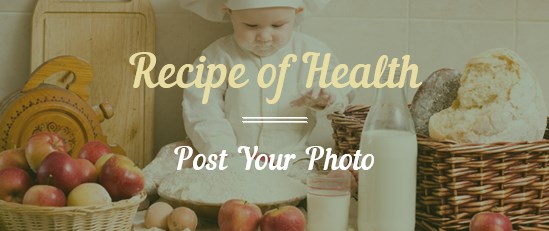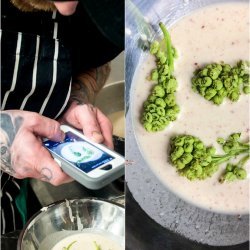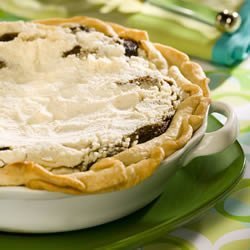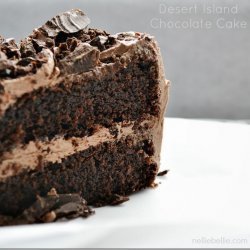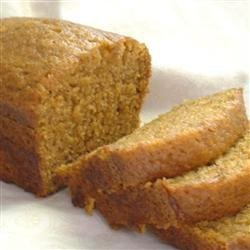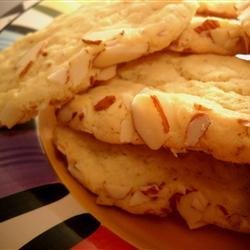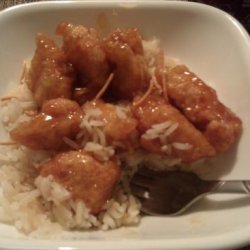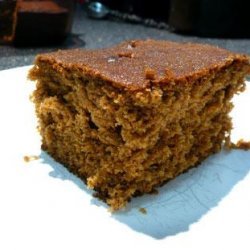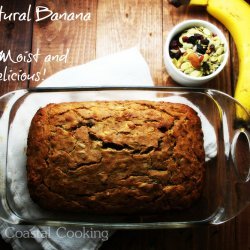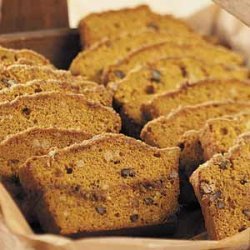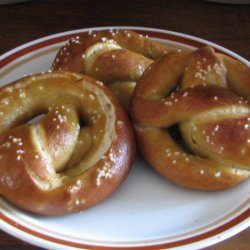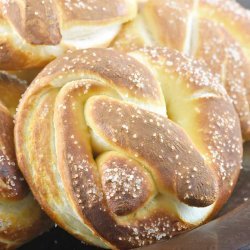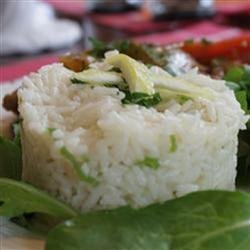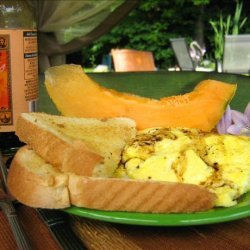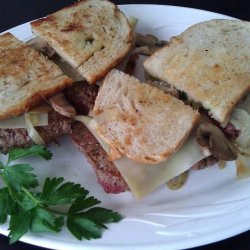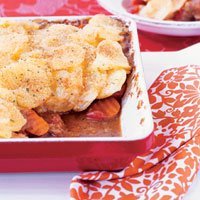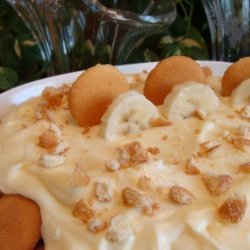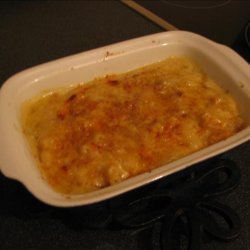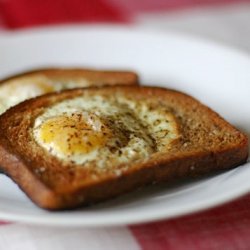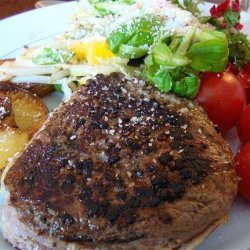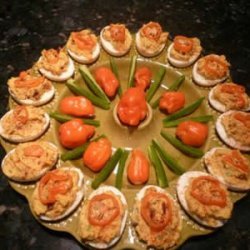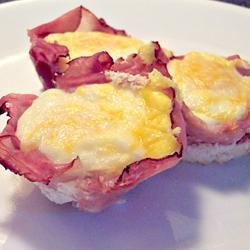Directions:
- Cover eggs with water 2 above and bring to a slow boil.
- Boil 12 minutes.
- Place eggs in ice water for 12 minutes.
- Crack and take a small part off top and bottom.
- Blow into top. The egg will pop out in your hand.
- OR.
- 1. For perfect cooking, start with eggs that don't have any visible cracks:.
- There are two problems you'll want to avoid: cracked shells and the ugly green layer that can form around the yolk.
- Do not add salt to water. The salt will raise the boiling point of the water making the egg whites rubbery.
- 2. The best eggs for boiling are NOT the freshest eggs - use eggs that are at least 3 to 5 days:.
- Eggs that are too fresh are difficult to peel. The fresher the eggs, the harder it will be to peel them because the white membrane is just not mature enough. Hard boiling farm fresh eggs will invariably lead to eggs that are difficult to peel. Eggs need to be at least three (3) days old to peel well.
- First, figure out if your eggs are fresh, because looking at the date on the carton is not always the best indicator of freshness, as eggs within the same carton with the same sell-by-date could have been laid on different days. Check out Sell Date of Eggs.
- In a fresh egg, the yolk stands tall and the white is thick and cloudy. In an older egg, the yolk looks flatter and breaks easily, and the white is thin and watery.
- The best eggs for boiling are the ones on their way to standing up because that extra air makes peeling easier. That's why you should buy eggs for hard-cooking at least a week ahead of time.
- How To Test Freshness of Eggs: A simple test in water will answer the freshness question for you. Place the egg in a bowl of water; if it lies on its side, it is very fresh. As it ages, the air pocket inside the egg grows, which buoys the egg up so it stands on one end. If the egg floats to the top, it is ready for the trash.
- Making Deviled Eggs: When making deviled eggs, place the carton of eggs on its side for a day. The yolk will then center itself so you have it directly in the middle of the white. No more off centered deviled eggs.
- 3. Bring your eggs to room temperature before cooking:.
- If the egg has been stored in the refrigerator, it can be warmed gently under a flowing hot tap water or sit at room temperature for 20 to 30 minutes.
- By bringing the eggs to room temperature, they're much less likely to crack in the hot water. Also the temperature of the egg at the start of the cooking process will affect the cooking time.
- An egg that is at room temperature at the start of the cooking process will require about 1 minute less cooking time than eggs taken directly from the refrigerator.
- 4. Technique for hard-cooking (boiled) eggs:.
- Choose the right size pot to cook your eggs in: The eggs must not be stacked but be in one (1) layer only. Gently place the eggs in a single layer in a pan with enough cold water to cover eggs completely (approximately by 1 inch of water over the top of the eggs).
- Too much water will take too long for the water to get boiling, which can throw off the timing and give you overcooked eggs. Too little water causes parts of the eggs to be exposed and end up undercooked.
- If you have 2 or 3 layers of eggs stacked up in a small pot, they may cook unevenly. Use a large pan and limit cooking to two (2) dozen eggs at a time only.
- Over high heat, bring water JUST to a rapid boil.
- As soon as the water reaches a rapid boil, remove pan from heat and cover egg pan tightly with a lid.
- Set timer for 17 minutes for large eggs or 20 minutes for jumbo eggs.
- After 17 or 20 minutes (depending on size of your eggs), remove lid and drain off water from the eggs.
- Watch the time when cooking the eggs carefully. Overcooking causes a green layer to form around the yolk. This layer is caused by a reaction between the iron in the yolk and the sulfur in the white. Heat speeds up this reaction, so the longer your eggs cook, the greater the chance of discoloration.
- IMPORTANT - Stop the cooking process - Residual Heat or Carry Over Heat. .
- After the eggs are removed from the heat, some cooking will continue, particularly the yolk of the egg. This is due to residual heat called “carry over cooking,” For this reason, transfer the eggs to the bowl of ice cubes and/or cold water. While they're in the cold water, a layer of steam develops between the shell and the egg white. The steam helps make peeling an egg much easier.
- Let eggs cool at least 10 minutes in cold water, then drain. Either store in refrigerator or peel the eggs (see below for How To Peel Hard-Cooked Eggs Easily).
- A quick test to ensure that your eggs are hardboiled: When eggs have cooled, spin them on a hard surface (just like you would spin a top). If the eggs spins quickly without taking off or flying off in one direction, the egg is hard boiled and finished. Undercooked eggs (or uncooked eggs) will have a wobbly and unsteady spin.
- Storing of hard-cooked (boiled) eggs:.
- Refrigeration is necessary for hard boiled eggs if the eggs are not to be consumed within a few hours.
- It is preferable not to peel your eggs until you are ready to eat or use in your recipe. Hard-cooked eggs in the shell can be refrigerated up to one week.
- Peeled hard boiled eggs can be stored in the refrigerator in a bowl of cold water to cover for about 1 week (change the water daily) - or in a sealed container without water (cover the eggs with damp paper towels) for the same length of time.
- Medium.
- Soft-cooked yolk 3 minutes.
- Medium-cooked yolk 5 minutes.
- Hard-cooked yolk 12 minutes.
- Large.
- Soft-cooked yolk 4 to 5 minutes.
- Medium-cooked yolk 6 minutes.
- Hard-cooked yolk 17 minutes.
- Extra Large.
- Soft-cooked yolk 5 minutes.
- Medium-cooked yolk 7 to 8 minutes.
- Hard-cooked yolk 19 minutes.
Nutrition Facts
| Amount Per 1 Serving | |||
| Calories | 125.84 Kcal (527 kJ) | ||
| Calories from fat | 79.2 Kcal | ||
| % Daily Value* | |||
| Total Fat | 8.8g | 14% | |
|---|---|---|---|
| Cholesterol | 327.36mg | 109% | |
| Sodium | 124.96mg | 5% | |
| Potassium | 121.44mg | 3% | |
| Total Carbs | 0.88g | 0% | |
| Protein | 11.44g | 23% | |
| Iron | 1.8mg | 10% | |
| Calcium | 49.3mg | 5% | |
| Amount Per 100 g | |||
| Calories | 143 Kcal (599 kJ) | ||
| Calories from fat | 90 Kcal | ||
| % Daily Value* | |||
| Total Fat | 10g | 14% | |
|---|---|---|---|
| Cholesterol | 372mg | 109% | |
| Sodium | 142mg | 5% | |
| Potassium | 138mg | 3% | |
| Total Carbs | 1g | 0% | |
| Protein | 13g | 23% | |
| Iron | 2mg | 10% | |
| Calcium | 56mg | 5% | |
* Percent Daily Values are based on a 2000 calorie diet. Your daily values may be higher or lower depending on your calorie needs.
Find out how many calories should you eat.
Get Your Recipe of Health!
Follow RecipeOfHealth on Facebook!

